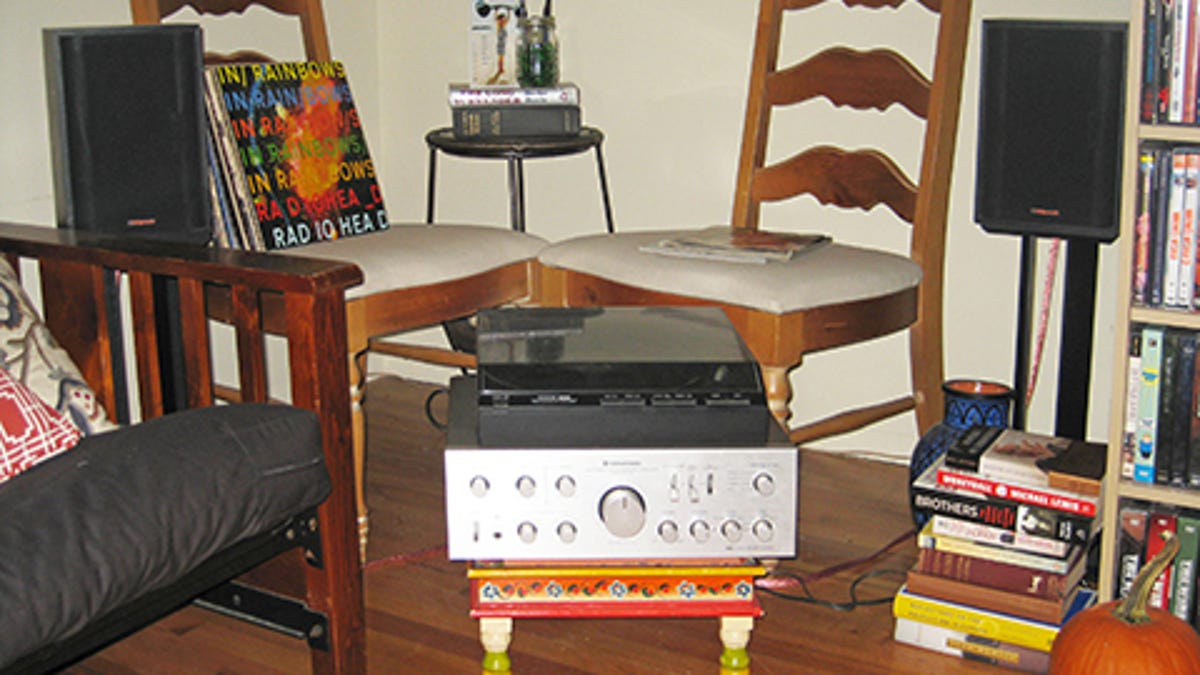Can you buy a great hi-fi on a budget?
A great hi-fi doesn't have to be expensive; a wise shopper can put together a nice system on the cheap.

What's the definition of a great hi-fi? It's the one you're listening to. Not just for background "listening," but actual, focused listening.
Investing a lot of money on a hi-fi isn't the only way to get there. In fact, spending as little as possible on decent gear is the best way to get acquainted with good sound. Who knows, you might become an audiophile.
My friend Matt Calderone might be on his way. He was given a used Denon DP-7F turntable, and recently bought a Kenwood KA-701 integrated stereo amplifier on eBay and a pair of Klipsch speakers through Craigslist. All told, he spent less than $200.
Calderone is 26 years old so I was curious about how and why he wound up with a hi-fi. He says he's always been interested in LPs, and he likes listening to them over a decent stereo, not computer speakers. Calderone thinks good speakers make a big difference.
It's not just that the sound is better, music engages on a different level when heard over a hi-fi. Calderone frequently winds up just sitting on the couch and get this, he listens to entire records! The music is the main focus; vinyl has that effect on some people. Calderone is going to add a CD player soon, but for now his system is analog only.
The hardest part of buying a used hi-fi is picking the right gear. If you're new to hi-fi ask an older relative who knows audio about which brands are worthy, but for starters I'd recommend steering clear of Sony and Bose products. I like Creek, Denon, NAD, Onkyo, Pioneer, and Yamaha amplifiers and receivers; look for used Advent, AR, Boston Acoustics, DCM, Epos, Infinity, Klipsch, Magnepan, Mirage, Monitor Audio, NHT, Polk, Snell, or Vandersteen speakers. For a few hundred bucks you can put together a very listenable used system.
Turntables are trickier to buy used; they're pretty delicate so there's too much that can go wrong, and shipping turntables is problematic. I recommend buying local and make sure it works before you buy. Works means not just spinning a record, but actually listening to a record.
So if you can't spring for the high-end gear I cover here at the Audiophiliac there are deals to be found on the Internet. I've personally sold a lot of gear on Audiogon, and it's the best site to score deals on used high-end components. For a few grand you can grab bona-fide high-end bargains. High-end is never cheap, but if you buy the right gear it'll last decades.
Calderone sent a link to a terrific Jeff Tweedy interview in the Austin Chronicle that covers a lot of the same ground I write about. That is, how (so much) new technology has weakened our attachment to music. If you love music, don't you want to hear as much of the sound the musicians put on their records as possible?
Calderone's system proves the point: you don't have to invest wads of cash to get good sound. And it's not just "better sound"; a good hi-fi gets you closer to the music. It feels better, and you find yourself listening more. So much so you might even stop doing other stuff while you listen--put down that book, stop talking, or cleaning your apartment--and just close your eyes and really listen. If the music's good, it'll start to reach you on a whole different level.

